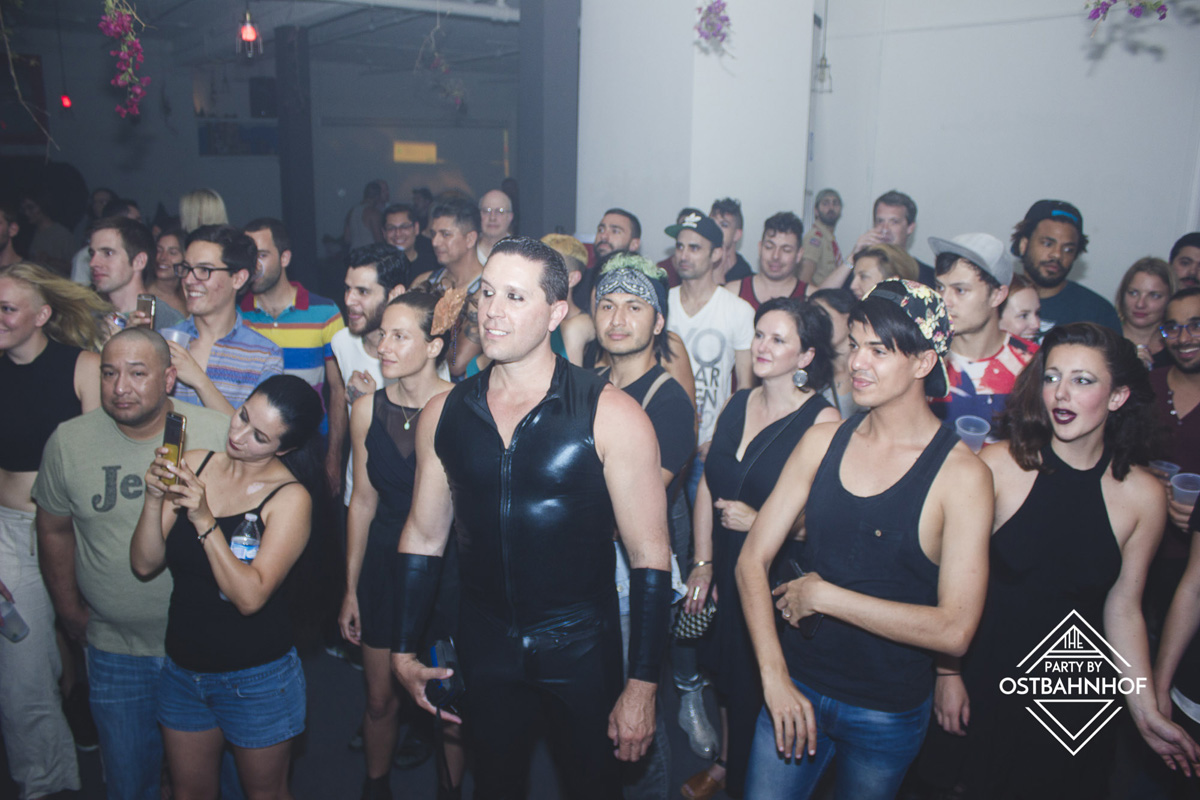Photo Gallery and Review: Ostbahnhof LA
With Orlando and Pride on our collective minds, XLR8R ventured to the newest party making headlines in the world of queer techno.

All photos byDerek Wanker.
In light of the horrific tragedy last week at Pulse—a gay and Latino nightclub in Orlando—as well as the numerous LGBT pride celebrations that have been taking place over the past few weeks, a collective focus has been placed on the role and importance of gay nightlife within dance music and club culture. Despite the unthinkable setback that occurred in Florida, it is crucial to note that the past couple of years have been characterized by gains for the queer electronic scene in America. We’ve seen the rise of gay techno parties like Spotlight, a Los Angeles-based underground that has already seen vanguards such as Matrixxman, Massimiliano Pagliara, and Prosumer grace its decks; we’ve witnessed sexually open and gender-inclusive events like A Club Called Rhonda hit commercial success with heavyweight bookings from the likes of Guy Gerber and Jackmaster, coupled with the expansion of their monthly party series to London, NYC, San Francisco, and more; and awareness about LGBTQ organizations and artists have reached unprecedented levels, with collectives like DISCWOMAN and openly transgender producers like Octo Octa paving the way for increased female, trans, and queer representation in electronic music culture. Highlighting these advancements in gay nightlife is a necessary step in moving past the inevitable sadness and anger that comes with thinking about and discussing acts of hate and violence. But we must also look towards the future by continuing to cover LGBT artists, DJ’s and queer-friendly events that are pushing musical and social boundaries forward.
When XLR8R was recently invited to attend the Los Angeles edition of The Party by Ostbahnhof, the newest brand of underground events making waves in the world of queer techno, we jumped at the opportunity to check out this thriving scene for ourselves. The roots of Ostbahnhof can be traced back to 2012 when East Coast transplant Derek Marshall opened The Club, a gay-friendly bar in the Neukölln district of Berlin. With its weekly art and electronic music showcases, lesbian nights, and “trash drag” contests, The Club quickly built up a solid reputation and following in Europe’s techno capital. But Marshall longed for more than just a single gay bar—he had the vision to create an international party series that could act as a “queer embassy” of sorts; a connecting platform and forum for LGBTQ artists, performers, DJs and partygoers in different cities around the world. Soon after relocating to New York City in December of last year, Marshall threw his first party in Brooklyn with the help of friends and artistic director Christopher Hershey-Van Horn, naming the event ‘Ostbahnhof’ after the famous Berlin metro station. In the six months since its first event, Ostbahnhof has witnessed astounding growth, spawning distinct-yet-interconnected communities of “radical self-expression” in Berlin, London, Los Angeles, and NYC.
For the third edition of Ostbahnhof LA, the series returned to its usual location in a sketchy sector of DTLA’s warehouse district. Taking place on the top floor of a seemingly abandoned apartment building only accessible by an enormous freight elevator, the industrial and raw feel of the space created a grungy atmosphere reminiscent of any notable Berlin club—a perfect fit for the character of Ostbahnhof. Upon reaching the top floor and entering through a door guarded by two wildly ornate drag queens (this time Marshall recruited local Rhonda icon Phyllis Navidad as Ostbahnhof’s gatekeeper), we were immediately encompassed by the booming vibrations of dark, mechanical techno pounding out of the sound system. Heidi Lawden, the London-born but Los Angeles-based DJ known for her association with the independent LA radio station dublab, was behind the booth crafting a trippy yet groove-inducing set to an intimate crowd of about 150 people. The group, which continued to grow larger through the course of the evening, consisted of an interesting mix of young and older gay men, straight couples, eclectically dressed women, and bearded hipster-looking guys—a refreshing combination of progressive, like-minded people that evoked a smaller Berghain or the early days of Spotlight or Rhonda.
Following Lawden’s sensational warm up and a strange but inspiring speech on queer empowerment by the Sisters of Perpetual Indulgence, Ostbahnhof Berlin resident S. Hedi stepped up, treating attendees to an impressive mix of rumbling and bouncy techno. Chris Bowen—who will soon celebrate the 7-year anniversary of his Bears in Space series with DJ Harvey—then took over the decks and exerted a mixing masterclass to finish off the party, commanding a selection of rough, echoing tech-house until the sun began to shine through the venue’s rusting window grates. Musically, the party exceeded expectations, validating Marshall’s artistic vision of creating a platform for local LGBT and queer-friendly artists to showcase their skills under the global umbrella brand of Ostbahnhof. Altogether, the event was impeccably organized and musically superb, fostering a truly unique and bohemian atmosphere with elements of Berlin, Los Angeles, and Marshall himself. This was the Los Angeles underground scene at its best, and the future looks bright for queer techno and Ostbahnhof.

